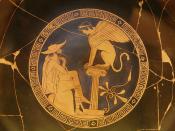Jocasta's philosophy of life is part of the main issue of Sophocles' play 'King Oedipus': destiny vs. freewill. Her statement "chance rules our lives", however, is quite ironic as Jocasta had taken the fate of her son, Oedipus, very seriously when he was first born, so much so as to have him left to die on Mount Cithaeron in order to avoid his destiny. Oedipus is also very closely related to this debate. Was it chance that caused him to kill his father and marry his mother as was prophesied or was it fate? This debate then extends to whether Oedipus deserved his self-inflicted punishment for his crimes. If it was fate and hence unavoidable, how could he be held responsible?
Jocasta paid a very heavy price for her attempts to thwart her son's fate. By sending him away to be exposed to the elements and die, rather than allowing him to live to fulfil his prophesised fate, Jocasta was effectively denying the gods as well as setting up the situation for the prophecy to come into reality.
By the choices she made, Oedipus grew up, by chance, not knowing who his true parents were so when he was killing his father and marrying his mother, by choice, he had no reason to think he might possibly be completing his fate. Ironically, Jocasta's fear of destiny was what brought it around and set her own fate. She believed she had disproved the prophecy and hence she rejected the gods and fate - "a fig for divination!" - only to learn that she was completely wrong and committed suicide for her punishment.
Jocasta did help set Oedipus' fate but he had a hand in it himself. The three flaws of his personality, rashness, quick and brutal...


